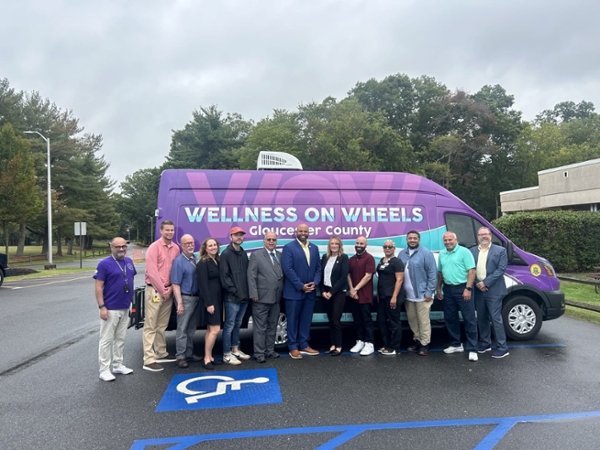Mobile Recovery Program: Bringing harm reduction to the community
Mobile Recovery Program: Bringing harm reduction to the community

In August 2025, Rowan-Virtua School of Osteopathic Medicine (SOM), in partnership with the Gloucester County Division of Addiction Services, launched the Rowan-Virtua and Gloucester County Mobile Recovery Program. This initiative will bring lifesaving harm reduction services directly to the communities most affected by the opioid crisis. Utilizing the county’s Wellness on Wheels (WOW) van and a specially outfitted trailer equipped with showers and laundry facilities, the program aims to break down barriers to care for individuals experiencing substance use disorder.
Led by Dr. Richard Jermyn, Dean of Rowan-Virtua SOM and the Rowan-Virtua Neuromusculoskeletal Institute (NMI), the mobile unit follows an interdisciplinary, evidence-based care model. The team includes physicians, nurse practitioners, social workers, peer recovery specialists, students, and data analysts, all working together to provide essential, community-based services.
The work is made possible through a $5 million grant awarded to Rowan-Virtua SOM to combat the opioid crisis in Gloucester County. Dr. George J. Scott, Associate Dean of Community Relations and Engagement, played a pivotal role in securing the grant and is overseeing its implementation.
Given Gloucester County’s limited public transportation infrastructure, a mobile approach is vital. Services include Medication-Assisted Treatment (MAT), naloxone distribution and training, HIV/STI education and testing, fentanyl and xylazine test strips, wound care, and case management. Peer counselors provide on-site support and help clients access primary care, mental health resources, housing, and long-term recovery support.
The program also prioritizes prevention and education. Collaborative outreach with Rowan-Virtua SOM and Rowan College of South Jersey targets schools, health care providers, veterans’ groups, and the general public. Efforts include opioid misuse awareness campaigns, youth education, safe prescribing training for clinicians, and expanding safe medication disposal. Social media campaigns developed by student teams will engage hard-to-reach populations, while RCSJ will offer career-building educational pathways to support recovery and long-term success.
By meeting individuals where they are—both geographically and emotionally—the Mobile Recovery Program offers a model of compassionate, equitable care. It not only enhances public health and safety but also serves as a transformative example of how strategic partnerships can fight the opioid crisis effectively.